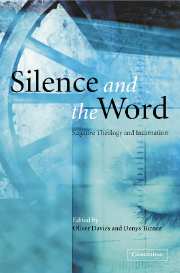Book contents
- Frontmatter
- Contents
- Notes on contributors
- Preface
- Introduction
- 1 Apophaticism, idolatry and the claims of reason
- 2 The quest for a place which is ‘not-a-place’: the hiddenness of God and the presence of God
- 3 The gift of the Name: Moses and the burning bush
- 4 Aquinas on the Trinity
- 5 Vere tu es Deus absconditus: the hidden God in Luther and some mystics
- 6 The deflections of desire: negative theology in trinitarian disclosure
- 7 The formation of mind: Trinity and understanding in Newman
- 8 ‘In the daylight forever?’: language and silence
- 9 Apophasis and the Shoah: where was Jesus Christ at Auschwitz?
- 10 Soundings: towards a theological poetics of silence
- Select bibliography
- Index
3 - The gift of the Name: Moses and the burning bush
Published online by Cambridge University Press: 22 September 2009
- Frontmatter
- Contents
- Notes on contributors
- Preface
- Introduction
- 1 Apophaticism, idolatry and the claims of reason
- 2 The quest for a place which is ‘not-a-place’: the hiddenness of God and the presence of God
- 3 The gift of the Name: Moses and the burning bush
- 4 Aquinas on the Trinity
- 5 Vere tu es Deus absconditus: the hidden God in Luther and some mystics
- 6 The deflections of desire: negative theology in trinitarian disclosure
- 7 The formation of mind: Trinity and understanding in Newman
- 8 ‘In the daylight forever?’: language and silence
- 9 Apophasis and the Shoah: where was Jesus Christ at Auschwitz?
- 10 Soundings: towards a theological poetics of silence
- Select bibliography
- Index
Summary
You are great, Lord, and highly to be praised (Ps. 47:2): great is your power and your wisdom is immeasurable.
(Ps. 146:5)Man, a little piece of your creations, desires to praise you, a human being ‘bearing his mortality with him’ (2 Cor.4:10), carrying with him the witness of his sin and the witness that you ‘resist the proud’ (I Pet. 5:5). Nevertheless, to praise you is the desire of man, a little piece of your creation … Have mercy so that I may find words.
(From the opening lines of St Augustine's Confessions)I have become worried lately about the God of the attributes – the God of omnipotence, eternity, wisdom, immutability and unity – the God of these divine names. Reflection on this God, whether of a philosophical or a more contemplative nature, has been a uniting practice for Christians, Jews and Muslims. Yet lately this God, or this manner of speaking of God, has come under attack and it is not secular critics who are voicing criticisms but Christian preachers and theologians. ‘This God’, we hear, ‘is remote and unfeeling.’ … ‘This powerful, impassable and eternal God is far from us. This is a God “over and against” us’, and so on. Jürgen Moltmann (no mean critic) puts it this way:
If, in the manner of Greek philosophy, we ask what characteristics are ‘appropriate’ to the deity, then we have to exclude difference, diversity, movement and suffering from the divine nature … Impassable, immovable, united and self-sufficient, the deity confronts a moved, suffering and divided world that is never sufficient for itself.
- Type
- Chapter
- Information
- Silence and the WordNegative Theology and Incarnation, pp. 61 - 75Publisher: Cambridge University PressPrint publication year: 2002
- 2
- Cited by

